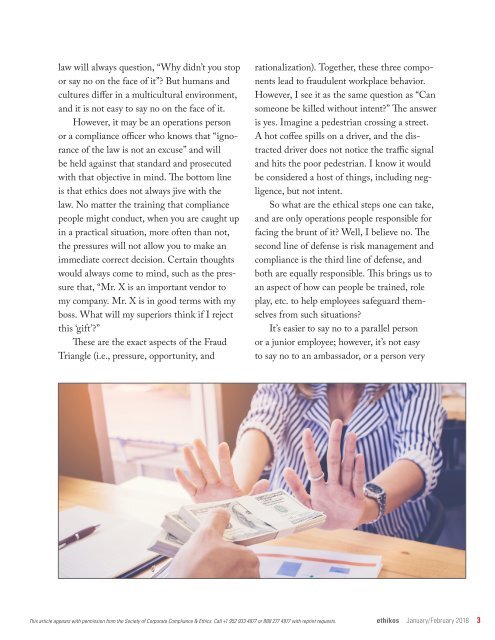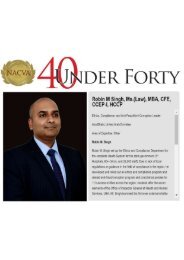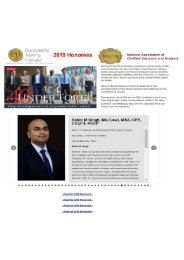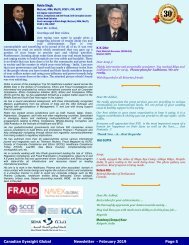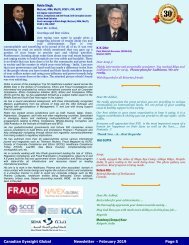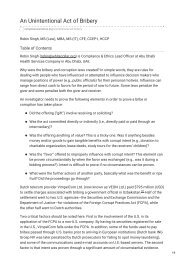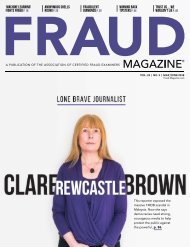What ethical and legal action can you take when you are forced to bribe? by Robin Singh
#ethical and #legal #actions when forced to #bribe #bealert dont be an #accessory to a #whitecollar #crime #ethics&compliance by #RobinSingh the #whitecollarinvestigator
#ethical and #legal #actions when forced to #bribe #bealert dont be an #accessory to a #whitecollar #crime
#ethics&compliance by #RobinSingh the #whitecollarinvestigator
Create successful ePaper yourself
Turn your PDF publications into a flip-book with our unique Google optimized e-Paper software.
law will always question, “Why didn’t <strong>you</strong> s<strong>to</strong>p<br />
or say no on the face of it”? But humans <strong>and</strong><br />
cultures differ in a multicultural environment,<br />
<strong>and</strong> it is not easy <strong>to</strong> say no on the face of it.<br />
However, it may be an operations person<br />
or a compliance officer who knows that “ignorance<br />
of the law is not an excuse” <strong>and</strong> will<br />
be held against that st<strong>and</strong>ard <strong>and</strong> prosecuted<br />
with that objective in mind. The bot<strong>to</strong>m line<br />
is that ethics does not always jive with the<br />
law. No matter the training that compliance<br />
people might conduct, <strong>when</strong> <strong>you</strong> <strong>are</strong> caught up<br />
in a practical situation, more often than not,<br />
the pressures will not allow <strong>you</strong> <strong>to</strong> make an<br />
immediate correct decision. Certain thoughts<br />
would always come <strong>to</strong> mind, such as the pressure<br />
that, “Mr. X is an important vendor <strong>to</strong><br />
my company. Mr. X is in good terms with my<br />
boss. <strong>What</strong> will my superiors think if I reject<br />
this ‘gift’?”<br />
These <strong>are</strong> the exact aspects of the Fraud<br />
Triangle (i.e., pressure, opportunity, <strong>and</strong><br />
rationalization). Together, these three components<br />
lead <strong>to</strong> fraudulent workplace behavior.<br />
However, I see it as the same question as “Can<br />
someone be killed without intent?” The answer<br />
is yes. Imagine a pedestrian crossing a street.<br />
A hot coffee spills on a driver, <strong>and</strong> the distracted<br />
driver does not notice the traffic signal<br />
<strong>and</strong> hits the poor pedestrian. I know it would<br />
be considered a host of things, including negligence,<br />
but not intent.<br />
So what <strong>are</strong> the <strong>ethical</strong> steps one <strong>can</strong> <strong>take</strong>,<br />
<strong>and</strong> <strong>are</strong> only operations people responsible for<br />
facing the brunt of it? Well, I believe no. The<br />
second line of defense is risk management <strong>and</strong><br />
compliance is the third line of defense, <strong>and</strong><br />
both <strong>are</strong> equally responsible. This brings us <strong>to</strong><br />
an aspect of how <strong>can</strong> people be trained, role<br />
play, etc. <strong>to</strong> help employees safeguard themselves<br />
from such situations?<br />
It’s easier <strong>to</strong> say no <strong>to</strong> a parallel person<br />
or a junior employee; however, it’s not easy<br />
<strong>to</strong> say no <strong>to</strong> an ambassador, or a person very<br />
This article appears with permission from the Society of Corporate Compliance & Ethics. Call +1 952 933 4977 or 888 277 4977 with reprint requests.<br />
ethikos January/February 2018 3


